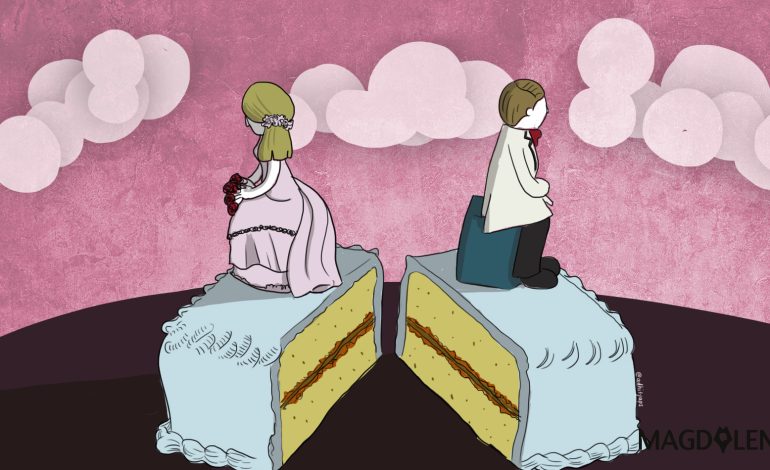Happily Ever After Divorce

I wish that every time I go to a wedding, I could tell the ugly truth to the bride that marriage is not a fairy tale. From my nine-year-long marriage, I’ve learned that the more empowered you are, the more difficult it is to stay in a marriage.
Marital institution in Indonesia dictates conventional roles for a husband and a wife. They define man, the husband, as the head of the household, the breadwinner of the family, while woman as the housewife. But these traditional roles of husband and wife are no longer relevant to women in the present day. Women now have jobs and earn money for a living too. In fact, these days many working wives take the traditional role of a husband.
Unfortunately, such a shift in role is not equally applied to men. Women are allowed to work, but society still expects them to do house chores. Although their wives earn money to support their households equally, many husband do not feel obliged to share the burden of domestic chores, maintaining their traditional role as the head of the household.
The campaign for women’s empowerment has been going on since the Kartini era in early 1900s. At the same time economic pressure has led to more women to enter the job market. However, this traditional concept of marriage has not changed. When working women can no longer endure the double burden of a conventional marriage anymore, they have little choice but to divorce their husbands.
Over the past five years the Ministry of Religious Affairs reported an 80 percent increase in divorce cases. Between 2012 and 2013, there were 350,000 divorce cases, averaging 40 divorces every hour. Seventy percent of the divorce cases were filed by women. One of them was mine.
The Good Girl vs the King
I went to Banyuwangi, East Java, for a weekend recently to conduct a research on women and divorces. Banyuwangi has the third highest divorce rate in Indonesia after Indramayu in West Java, and Surabaya, East Java. From January to August 2016, 4,208 divorce cases were registered the local religious court and a majority of them were filed by women.
“I got a divorce because my husband was abusive,” said Dyah Ayu Puji Prastiwi, a 41-year old elementary school teacher who belongs to the indigenous Osing women group of Banyuwangi.
Dyah experienced domestic violence psychologically and physically. Her husband cheated on her for four years, and this eventually led to their separation. After they were separated, Dyah became close to a male friend, which made her husband jealous. One day he hit her with a helmet, breaking four of her teeth. She had to have a medical treatment and now she has implanted teeth.
She had been married for 17 years with four children then. But because she and her former husband are civil servants, it took her two years to get a permission from the district head in order to get a divorce. Early this year, they were finally legally divorced.
“I am okay now that I’m divorced. But I don’t want to bring the domestic violence case to criminal court, because I don’t want my children to see their father in prison,” Dyah added.
Young girls are raised to be good girls, which means serving others….. while boys are raised as a “king.” The whole family serves them.
There are many cases like this. Perpetrators of domestic violence go unpunished because religious court in Indonesia does not have the authority to process criminal cases and because women feel responsibility towards their children and husbands. Our legal system puts domestic violence to silence.
Another reason why more women filed for divorce is our failure to teach boys about respect towards girls and equality. Young girls are raised to be good girls, which, in my experience, means helping your mother to serve your father, your brothers, your uncle and other relatives. After they’ve grown up, women have to get married, which means serving their husbands. Being a good girl is all about making others happy, because women are raised to work for others and to think about other people’s wellbeing all the time. In a way, this makes them more independent and more caring.
On the other hand, boys are traditionally raised as a “king.” The whole family serves them. They are not encouraged to think about others’ wellbeing or feelings. They never have to think about what makes their mothers or sisters happy. As an adult later, these men will find it hard understand their wives, or what makes their wives happy. Most boys are raised to be selfish.
Another traditional aspect of marriage in Indonesia is that people get married so young. UNICEF estimated that one in every four girls in Indonesia is married before the age of 18. Indonesia now has the highest rate of child marriage across South East Asia. This also contributes to the rising number of divorces.
There is a misguided belief that more women choose to divorce their spouse because they can now work and earn money so they abandon their “traditional roles.” The truth is working women are still expected to work at home and the double burden is killing us. And even under this much pressure, women would still think twice before filing for a divorce, because being married is fundamentally important in this society.
A divorced woman has to live with the stigma as a failure. The “janda” (a woman who is a divorcee or a widow) stigma and the fear of being lonely make women work hard to keep their marriage intact. Believe me, getting a divorce is never an easy decision for a woman.
When women cannot stand the unfairness in their marriage, going to Court to file a divorce is our final effort to end the misery. Luckily, Indonesia’s religious court is women friendly. A 2015 survey conducted by the international development organization Asia Foundation found that the religious court was the most trustworthy and best-performing court in Indonesia, with up to 80 percent expressing the highest level of satisfaction, compared 70 percent for the General Court.
My experience at Cibinong Religious Court confirms this positive rating. The administration process took less than an hour. Although the lawyer’s fee was quite expensive, the registration cost was affordable, totalling Rp 700 thousand (about US$52). The trial process was quick and the judges approved my divorce after three hearings within four months. The divorce certificate was issued eight weeks later.
Given such circumstances, I am not saying that we should not get married but the roles of a husband and a wife in marriage must change. There are ways to make marriage works, and one of them is by promoting a new concept of marriage in which the husband and wife are equal. Society should evolve by teaching our boys that house chores are shared responsibilities and that serving others is as much a duty for boys as it is for girls.
Unless we change our current perception of gender roles, the only way a woman can live happily is after her divorce.
Firliana Purwanti is the author of “The O Project”.






















